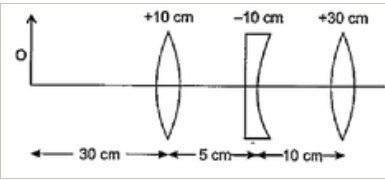The operation of a nuclear reactor is said to be critical, if the multiplication factor (k) has a value
1
1.5
2.1
2.5
The correct Answer is:A
To determine the condition for a nuclear reactor to be in a critical state, we need to understand the concept of the multiplication factor (k).
1. Understanding the Multiplication Factor (k):
The multiplication factor (k) is defined as the ratio of the number of neutrons in one generation to the number of neutrons in the preceding generation. Mathematically, it can be expressed as:
k=Nn+1Nn
where Nn+1 is the number of neutrons in the current generation and Nn is the number of neutrons in the previous generation.
2. Critical Condition:
A nuclear reactor is said to be in a critical state when the chain reaction is self-sustaining. This occurs when the number of neutrons produced in one generation is equal to the number of neutrons from the previous generation.
3. Setting the Condition for Criticality:
For the reactor to be critical, the multiplication factor (k) must equal 1:
k=1
This implies that the number of neutrons produced in one generation is exactly equal to the number of neutrons from the previous generation.
4. Implications of k = 1:
When k=1:
- The neutron population remains constant.
- The chain reaction neither increases nor decreases, indicating a stable and controlled reaction.
5. Conclusion:
Therefore, the operation of a nuclear reactor is said to be critical if the multiplication factor (k) has a value of 1.
Final Answer:
The operation of a nuclear reactor is said to be critical if the multiplication factor (k) has a value of 1.
---
The multiplication factor (k) is defined as the ratio of the number of neutrons in one generation to the number of neutrons in the preceding generation. Mathematically, it can be expressed as:
k=Nn+1Nn
where Nn+1 is the number of neutrons in the current generation and Nn is the number of neutrons in the previous generation.
A nuclear reactor is said to be in a critical state when the chain reaction is self-sustaining. This occurs when the number of neutrons produced in one generation is equal to the number of neutrons from the previous generation.
For the reactor to be critical, the multiplication factor (k) must equal 1:
k=1
This implies that the number of neutrons produced in one generation is exactly equal to the number of neutrons from the previous generation.
When k=1:
- The neutron population remains constant.
- The chain reaction neither increases nor decreases, indicating a stable and controlled reaction.
Therefore, the operation of a nuclear reactor is said to be critical if the multiplication factor (k) has a value of 1.
The operation of a nuclear reactor is said to be critical if the multiplication factor (k) has a value of 1.
Topper's Solved these Questions
- NUCLEIBOOK - DC PANDEY ENGLISHCHAPTER - NUCLEIEXERCISE - B Medical entrance special format questions
9 Videos
- NUCLEIBOOK - DC PANDEY ENGLISHCHAPTER - NUCLEIEXERCISE - MATCH THE COLUMNS
4 Videos
- NUCLEIBOOK - DC PANDEY ENGLISHCHAPTER - NUCLEIEXERCISE - CHECK POINT 13.3
15 Videos
- MODERN PHYSICS - 2BOOK - DC PANDEY ENGLISHCHAPTER - MODERN PHYSICS - 2EXERCISE - Level 2 Subjective
10 Videos
- RAY OPTICSBOOK - DC PANDEY ENGLISHCHAPTER - RAY OPTICSEXERCISE - Medical entrance gallary
76 Videos
Similar Questions
The most important use of studying nuclear fission and fusion process was to harness nuclear energy for useful purpose of humanity. Nuclear reactor is the machine designed to harness nuclear energy to electricity. The basic principle involved is fission of uranium to krypton and barium by slow moving neutrons as in following 0n1+23592U→9632Kr+14156Ba+30n1+Q(200MeV) reaction:
But the difficulty is that one neutron striking with 23592U produces three (2.6 on an average) neutrons which can cause further fission The neutron intensity available for further fission is controlled by measuring reproduction factor defined as the average number of neutrons from each fission the causes further fission. Maximum value of K 2.6. For optimum operation of nuclear reactor, the value of Kis mentioned in Column-1 for various stages in Columu-Il match the correct columns :
Column-IColumn-II(A)K=1(p)Uncontrolled chain reaction(B)K<1(q)Critical(C)K≥1(r)Sub critical(D)K≈25(s)Super critical
View SolutionWhich of the following has highest Ka value?
View SolutionWhen a system of linear equations said to be consistent. For what value of k will the equations 3x + 4y + 2 = 0 and 9x + 12y + k = 0 are dependent ?
View Solution(a) Under what conditions is the phenomenon of total internal reflection of light observed? Obtain the relation between the critical angle of incidence and the refractive index of the medium.
(b) Three lenses of focal lengths +10cm,−10cmand+30cm are arranged coaxially as in the figure given below. Find the position of the final image formed by the combination.

(b) (i) Write a balanced equation showing nuclear fission of Uranium (23592U) nucleus.
(ii) In a nuclear reactor, what is the function of :
(a) Cadmium rods? (b) Graphite rods?
View SolutionThe compressibility factor in terms of Pc, Vc and Tc is called Zc.
The value of critical compressibility factor Zc is approximately
View SolutionFor what value of k the equation sinx+cos(k+x)+cos(k−x)=2 has real solutions?
View SolutionThe pH of a 2 M solution of a weak monobasic acid (HA) is 4. What is the value of the Van’t Hoff factor?
View SolutionThe activation energy of a reaction is 94.14kJmol−1 and the value of rate constant at 313K is 18×10−5s−1. Calculate the frequency factor or pre-exponential factor, A.
View SolutionEvery counting number has an infinite number of (a)factors (b) multiples prime factors (d) none of these
View Solution(a) How much mass is lost per day by a nuclear reactor operated at a 109 watt power level?
(b) If each fission releases 200 MeV, how many fissions occur per second to yield this power level?
View Solution
